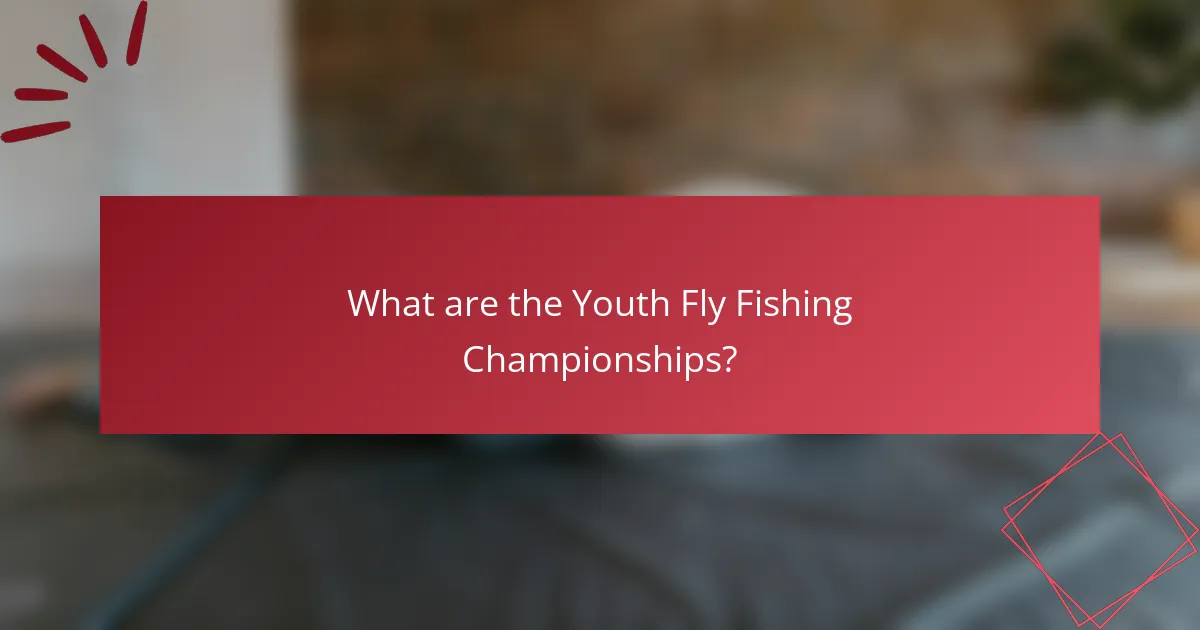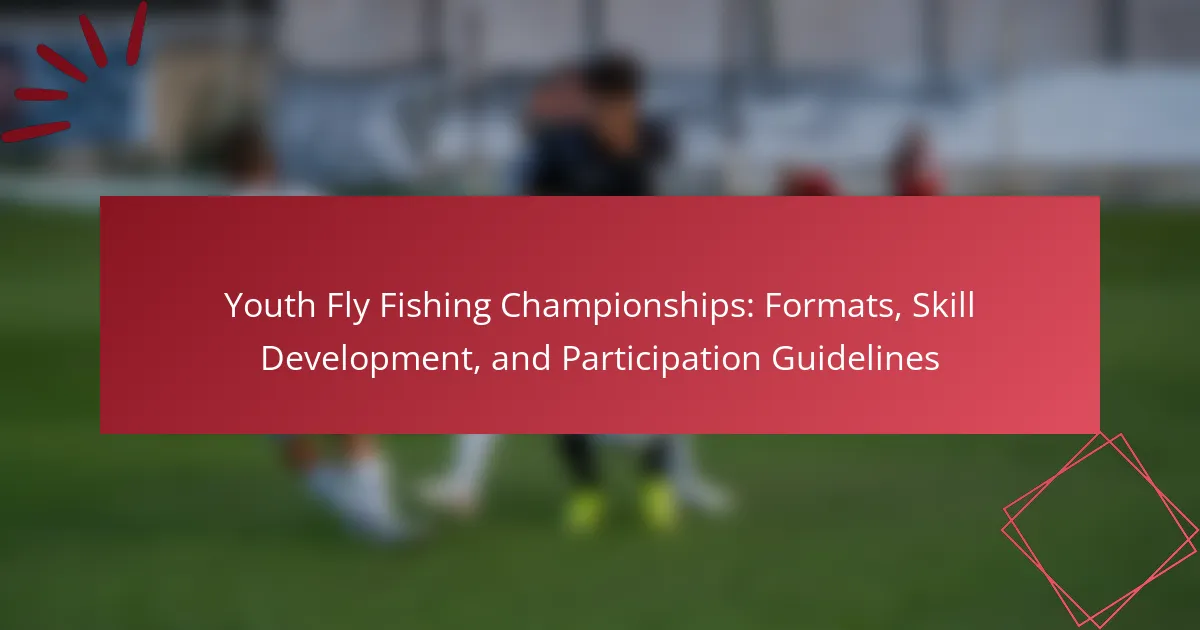The Youth Fly Fishing Championships are competitive events designed for young anglers aged 12 to 18, emphasizing essential skills such as casting, knot tying, and fish identification. These championships are organized at local, regional, and national levels, featuring both individual and team formats. The primary goal is to promote fly fishing as a sport among youth while providing opportunities for skill development and mentorship. Supported by organizations like Trout Unlimited, these events encourage youth participation in fishing and conservation efforts, fostering a deeper connection to the sport and the environment.

What are the Youth Fly Fishing Championships?
The Youth Fly Fishing Championships are competitive events for young anglers. These championships focus on skills such as casting, knot tying, and fish identification. Participants typically range from ages 12 to 18. The events are organized at local, regional, and national levels. They aim to promote fly fishing as a sport among youth. Competitions often include both individual and team formats. The championships provide opportunities for skill development and mentorship. Many organizations, such as Trout Unlimited, support these events to encourage youth participation in conservation and fishing.
How are the Youth Fly Fishing Championships structured?
The Youth Fly Fishing Championships are structured into multiple competitive categories. These categories typically include age divisions such as 10-12, 13-15, and 16-18 years old. Each division has specific rules and regulations tailored to the skill levels of the participants. Competitors are assessed based on casting accuracy, technique, and fish-catching ability. Points are awarded for each category, and overall winners are determined by the highest scores. The championships often feature both individual and team events, promoting collaboration and sportsmanship. Additionally, workshops and skill development sessions are included to enhance participants’ techniques and knowledge. This structure ensures a comprehensive and engaging experience for all youth anglers.
What are the various formats of competition in the championships?
The various formats of competition in the Youth Fly Fishing Championships include individual events, team events, and relay formats. Individual events focus on individual skill, where participants compete based on their own performance. Team events promote collaboration, as teams of anglers work together to achieve the best overall score. Relay formats involve teams competing in a sequence, with each member completing a specific task. These formats allow for diverse skill demonstrations and foster camaraderie among participants. The championships are structured to enhance both competitive spirit and skill development in youth anglers.
How do different age categories participate in the championships?
Different age categories participate in the championships through age-specific divisions. These divisions ensure fair competition among participants of similar ages. Typically, categories include under-12, under-15, under-18, and sometimes under-21. Each category has tailored rules and event formats. For instance, younger participants may engage in shorter casting distances. Older categories often face more challenging conditions and longer distances. This structure promotes skill development appropriate to each age group. Participation statistics show increased engagement in all age divisions over recent years.
What skills are developed through participation in the Youth Fly Fishing Championships?
Participation in the Youth Fly Fishing Championships develops various skills. These include casting techniques, which enhance precision and control. Participants also learn knot tying, essential for securing flies and lures. The championships promote patience and focus, as fishing requires sustained attention. Additionally, participants gain knowledge of aquatic ecosystems and fish behavior. Teamwork and communication skills are fostered through collaborative events. Problem-solving abilities are enhanced when adapting to changing fishing conditions. Lastly, sportsmanship and respect for nature are integral values learned during the competition.
How does fly casting technique improve with practice?
Fly casting technique improves with practice through enhanced muscle memory and precision. Repeated casting helps anglers develop a consistent rhythm and timing. This leads to better control over line speed and trajectory. Practicing various casting distances increases adaptability in different fishing scenarios. Anglers learn to adjust their technique for wind conditions and obstacles. As they practice, they also develop a deeper understanding of rod action and line dynamics. Studies show that regular practice can lead to significant improvements in casting distance and accuracy. Consistent feedback during practice sessions further accelerates skill development.
What role does knot tying play in skill development?
Knot tying plays a crucial role in skill development for youth in fly fishing. Mastering knot tying enhances dexterity and hand-eye coordination. It requires focus and precision, fostering attention to detail. Learning various knots also builds problem-solving skills. Each knot serves a specific purpose, encouraging critical thinking about tackle choices. Studies show that hands-on skills like knot tying improve overall motor skills in youth. Additionally, the ability to tie strong, reliable knots increases confidence in fishing abilities. This foundational skill is essential for success in competitive environments like youth fly fishing championships.
What are the participation guidelines for the Youth Fly Fishing Championships?
The participation guidelines for the Youth Fly Fishing Championships require participants to be between the ages of 12 and 18. Each participant must register in advance through the official championship website. A valid fishing license may be necessary, depending on local regulations. Participants must provide their own fly fishing gear, including rods, reels, and flies. Safety gear, such as life jackets, is mandatory during the event. Additionally, participants must adhere to all tournament rules and conduct guidelines. The event may also require parental consent for minors. These guidelines ensure a safe and fair competition for all youth anglers.
What are the eligibility requirements for participants?
Participants must be between the ages of 12 and 18 to be eligible for the Youth Fly Fishing Championships. They should also possess a valid fishing license, which varies by state or region. Additionally, participants need to demonstrate basic fly fishing skills and knowledge. Proof of participation in a fly fishing workshop or training session may be required. Some events may have specific residency requirements, necessitating proof of local residency. Participants must also agree to the competition rules and guidelines set forth by the organizing body. Finally, parental consent is typically required for minors participating in the event.
How do registration processes work for the championships?
Registration processes for the championships involve several key steps. Participants must first complete an online registration form. This form typically requires personal information and details about the participant’s experience level. After submission, participants may need to pay an entry fee. Payment methods usually include credit card or electronic transfer.
Once the registration is confirmed, participants receive a confirmation email. This email includes important details about the event, such as dates and location. Additionally, participants might need to sign a waiver or consent form.
The registration process is designed to ensure that all participants meet the eligibility criteria. These criteria often include age restrictions and skill levels. Timely registration is crucial, as spots may be limited.
In summary, the registration process is straightforward and aims to facilitate participation while ensuring compliance with championship guidelines.
How do the Youth Fly Fishing Championships promote environmental awareness?
The Youth Fly Fishing Championships promote environmental awareness by educating participants about aquatic ecosystems. Competitors learn the importance of water quality and habitat conservation. Workshops often include sessions on sustainable fishing practices. Participants engage in hands-on activities like river clean-ups. These experiences foster a sense of stewardship towards natural resources. Additionally, the championships often partner with conservation organizations. This collaboration helps raise awareness about local environmental issues. Together, they emphasize the role of youth in protecting waterways for future generations.
What resources are available for young anglers to enhance their skills?
Young anglers can enhance their skills through various resources. Local fishing clubs offer mentorship and hands-on training. Online platforms provide instructional videos and tutorials. Books and guides on fishing techniques are widely available. Workshops and camps focus on skill development and practice. Competitions, such as youth fly fishing championships, encourage practical experience. Local conservation organizations often host educational events. These resources collectively foster learning and improvement for young anglers.
What are some recommended books and online courses for youth fly fishing?
Recommended books for youth fly fishing include “The Little Red Book of Fly Fishing” by Kirk Deeter and Charlie Meyers. This book simplifies fly fishing techniques for beginners. “Fly Fishing for Kids” by John W. H. Weller offers engaging illustrations and easy-to-follow instructions. Online courses such as “Fly Fishing 101” on platforms like Udemy provide structured lessons for youth. The Trout Unlimited website also offers free resources and tutorials tailored for young anglers. These materials are designed to build foundational skills in fly fishing.
How can mentorship programs benefit young participants?
Mentorship programs can significantly benefit young participants by providing guidance and support. These programs help develop essential skills and foster personal growth. Young individuals gain insights from experienced mentors, enhancing their knowledge and abilities. Mentorship often leads to increased confidence and improved decision-making skills. Research shows that mentored youth are more likely to pursue higher education and career opportunities. According to a study by the National Mentoring Partnership, mentored youth are 55% more likely to enroll in college. Additionally, mentorship fosters networking opportunities, connecting young participants with professionals in their field of interest. These connections can lead to internships and job placements, further benefiting their career paths.
What tips can help young anglers succeed in the Youth Fly Fishing Championships?
Young anglers can succeed in the Youth Fly Fishing Championships by practicing regularly. Consistent practice helps improve casting techniques and accuracy. Understanding local fishing regulations is crucial for compliance during the competition. Engaging with experienced anglers provides valuable insights and tips. Selecting the right fly patterns based on local fish species increases chances of success. Staying patient and focused during casting enhances overall performance. Lastly, maintaining a positive attitude fosters resilience in challenging situations. These tips are essential for achieving success in competitive fly fishing.
The Youth Fly Fishing Championships are competitive events designed for young anglers aged 12 to 18, emphasizing skills such as casting, knot tying, and fish identification. The championships are structured into various age-specific categories and formats, including individual and team events, to promote collaboration and skill development. Participants gain valuable experience and knowledge about aquatic ecosystems while adhering to specific guidelines and eligibility requirements. Resources for skill enhancement, mentorship opportunities, and tips for success in competitions are also discussed, highlighting the championships’ role in fostering youth engagement in fly fishing and environmental conservation.
